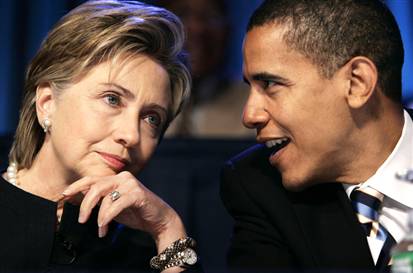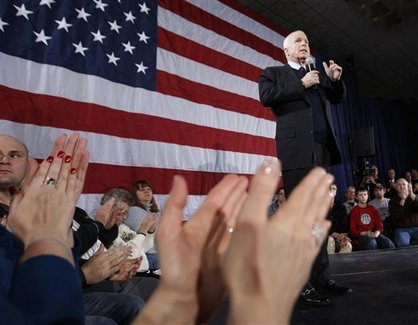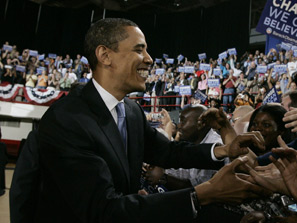Clinton & Obama fight, a party suffers.

Many were hoping that March 4th would result in an obvious Democratic nominee. It was doubted Clinton would drop out, even if she lost every race that day, but now it seems the race for the Democratic nomination for President will go on to the Democratic National Convention in Denver at the end of August. This is a very unfortunate turn of events for the Democratic Party, and a boon for the Republican nominee, John McCain. Looking at the races over the next few months, we can see that a clear winner is highly unlikely, momentum or not.
- Wyoming, a red state, will caucus tomorrow. Red states and caucuses have always been favorable to Obama, however with momentum for Clinton’s recent wins, Wyoming could be an upset.
- March 11 is Mississippi and it’s 40 delegates; a likely win for Obama.
- Pennsylvania, on April 22, will be a big race, and a difficult one for Obama. His campaign will need to step things up to pull out a win in PA, and I just don’t think that’s possible; however, it will be close.
- May 3rd is Guam and 9 delegate
- May 6th is Indian and North Carolina, both primaries, for a total of 218 delegates. Both could be difficult for Clinton, but the races could go either way, depending on the effectiveness of Clinton’s campaigning over the next two months.
Pennsylvania will be a huge turning point for Clinton, if she can win the state by a big margin. Overcoming the timing of events will be key for the Clinton campaign. The PA primary is in the middle of April, 42 days after Mississippi, leaving enough time for either candidate to find a winning campaign strategy in the state. The winner of the PA primary will need to keep the momentum going for two weeks, until the next big race on May 6th. And while Clinton is expected to win the PA primary, the fact that it is surrounded by races likely to favor Obama is not good for her campaign.

The battle for the nomination is likely to continue until August, much to the pleasure of the Republican Party. With McCain’s clinching of the Republican nomination last Tuesday, his only duties right now are to earn money and watch both Democratic candidates fight each other, all the while campaigning for President.
Clinton and Obama will try a variety of different tactics to win the nomination, and McCain’s campaign strategists can simply watch and see which tactics work best. As the process continues we may see more negative campaigning from Clinton and Obama, making the candidates appear more like squabbling siblings, than possible Presidents, and turning crucial independent voters off to their candidacy, and the Democratic Party.

Even more damaging for the DNC is the issue of Florida and Michigan. Both states disobeyed the DNC’s rules and moved their conventions earlier in the primary schedule than the DNC allowed. Now the delegates from each state are not going to be seated at the convention in August.
Clinton has argued that the delegates from the two states should be seated as is, but many feel that this is especially unfair, considering that in one of the states Clinton was the only candidate on the ballot. Having another election in both states, however, means millions of dollars from the DNC to cover the election costs, and millions of campaign spending from each candidate, lessening the candidate’s and party’s coffers for the general election. If this issue “goes legal,” it will be a huge black eye for the Democratic Party.
Republicans looking at polls have been seeing two things: Obama can win red states, and a Clinton vs. McCain general election race will be an easier race for McCain to win. It’s no wonder the Republican Governor of Florida is keeping the issue of his state’s Democratic voters and delegates in the news, and pushing for the delegates to be seated, as they are now, for Clinton.

The entire race will come to a head at the convention, and the nomination will likely come down to the superdelegates. DNC Chairman Howard Dean will certainly want to avoid the kind of turmoil the party saw in 1968, when a unpopular Hubert Humphrey secured the party’s nomination, despite not participating in any primaries, against the more popular Eugene McCarthy. It is very likely that the superdelegates will be strongly encouraged to vote according to the popular vote in their states or districts; meaning, whoever has the more popular vote and more pledged delegates will likely become the Democratic Party’s nominee.

